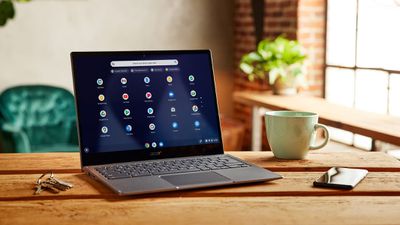Google Reportedly Developing Own Arm-Based Processors for Chromebooks After Being Inspired by Apple Silicon
After unveiling its latest Pixel 6 smartphones with a custom Arm-based Google Tensor chip last month, Google is also developing its own Arm-based processors for future Chromebook laptops and tablets, according to Nikkei Asia.

Google plans to roll out its own processors for Chromebooks in around 2023, according to the report. Chromebooks are laptops, tablets, and detachable devices that run Google's Chrome OS operating system, and they are available from brands such as Google, Samsung, Lenovo, Dell, HP, Acer, and ASUS in several markets.
The report claims that Google was particularly inspired by Apple's success in developing its own chips for not only iPhones, but also Macs following the introduction of the Apple-designed M1 chip last year. The first Macs with Apple silicon chips were released in November 2020 and Apple previously said the transition away from Intel-based processors for its Mac lineup would take about two years to be completed.
The latest Mac to transition to Apple silicon is the base model iMac, which was updated with the M1 chip, a colorful new design, and a larger 24-inch display in April. Apple is also rumored to be planning redesigned 14-inch and 16-inch MacBook Pro models with a faster version of the M1 chip for release later this year, with multiple reports having stated the notebooks are likely to be released in October or November.
Popular Stories
Despite being more than two years old, Apple's AirPods Pro 2 still dominate the premium wireless‑earbud space, thanks to a potent mix of top‑tier audio, class‑leading noise cancellation, and Apple's habit of delivering major new features through software updates. With AirPods Pro 3 widely expected to arrive in 2025, prospective buyers now face a familiar dilemma: snap up the proven...
Apple plans to release an all-new super thin iPhone this year, debuting it alongside the iPhone 17, iPhone 17 Pro, and iPhone 17 Pro Max. We've seen pictures of dummy models, cases, and renders with the design, but Lewis Hilsenteger of Unbox Therapy today showed off newer dummy models that give us a better idea of just how thin the "iPhone 17 Air" will be.
The iPhone 17 Air is expected to be ...
If you missed the video showing dummy models of Apple's all-new super thin iPhone 17 Air that's expected later this year, Sonny Dickson this morning shared some further images of the device in close alignment with the other dummy models in the iPhone 17 lineup, indicating just how thin it is likely to be in comparison.
The iPhone 17 Air is expected to be around 5.5mm thick – with a thicker ...
A developer has demonstrated Windows 11 ARM running on an M2 iPad Air using emulation, which has become much easier since the EU's Digital Markets Act (DMA) regulations came into effect.
As spotted by Windows Latest, NTDev shared an instance of the emulation on social media and posted a video on YouTube (embedded below) demonstrating it in action. The achievement relies on new EU regulatory...
Apple's iPhone development roadmap runs several years into the future and the company is continually working with suppliers on several successive iPhone models simultaneously, which is why we often get rumored features months ahead of launch. The iPhone 17 series is no different, and we already have a good idea of what to expect from Apple's 2025 smartphone lineup.
If you skipped the iPhone...
While the iPhone 17 Pro and iPhone 17 Pro Max are not expected to launch until September, there are already plenty of rumors about the devices.
Below, we recap key changes rumored for the iPhone 17 Pro models as of April 2025:
Aluminum frame: iPhone 17 Pro models are rumored to have an aluminum frame, whereas the iPhone 15 Pro and iPhone 16 Pro models have a titanium frame, and the iPhone ...
Apple seeded the third beta of iOS 18.5 to developers today, and so far the software update includes only a few minor changes.
The changes are in the Mail and Settings apps.
In the Mail app, you can now easily turn off contact photos directly within the app, by tapping on the circle with three dots in the top-right corner.
In the Settings app, AppleCare+ coverage information is more...






















